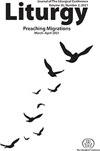Let the Blessings Flow: Liturgy and Race in the Last Fifty Years
IF 0.3
0 RELIGION
引用次数: 0
Abstract
The experience of Africans with Christianity predates the trans-Atlantic slave trade, yet many neglect this. Africans have been Christian since the earliest days of Christians. The reality that African American Christians continue to feel both the effects and traumatic reverberations of America’s problem with race cannot be doubted. This article has two foci: liturgy and race. I was asked if I would share a reflection highlighting aspects of what was referred to as the symbiotic nature of the relationship between liturgical scholarship and practice with particular attention to race in light of Sacrosanctum Concilium, the Second Vatican Council’s Constitution on the Liturgy. In giving this more thought, the realization soon came that implementing such writing is akin to tiptoeing through a minefield. Generally speaking, what exists in the minds of many about the development of historical worship practices are the result of gross oversimplifications. Amending simplifications by complexifying comprehension about what is popularly believed is beyond the limitations of this article. Yet, at the very least I hope to recast a few obscurities. We bring the world we live in and the culture(s) we live into the places and communities in which we worship. We worship, we say, so that—in the words of Rabbi Abraham Joshua Heschel—we may be released from the “tyranny of the world, from the tyranny of time,” and so enter into the realm of God, the realm of the divine. In that light, here are some questions I will address: Is racism coded within us? Are the neural pathways of those who claim “whiteness” predetermined so that those who make this claim believe that they naturally are entitled to receive and always be given the best and first of the world’s goods? Can we claim the existential ontological underpinnings of our faith traditions wherein we confess that the immersive waters of baptism and the Holy Spirit really wash away sin, death, and evil? Does baptism enable us to receive God’s gift of healing grace and blessing, a blessing bestowed to us through God’s created order, a blessing that permits us to go on living without yielding to the sin(s) of the cultural worlds from whence we come? Worship, in the popular imagination is seen often as a form of escapism—a flying away from the world—rather than that which grounds us, allowing us to exist more freely with God and within God’s realm, God’s kin-dom. Does the diversity of our understandings of Christianity forever lock us into separateness? The baggage of the world we bring can stop us from acknowledging that we all are children of God, that the parentage we ascribe to God, is meant to include everyone. What happens when the genius of Black culture(s), of African American culture(s), of nonwhite cultures are disinherited? What illnesses, what evil, what perilous death-dealing behaviors go unrecognized? How did the world we share, the worlds which we bring to our worshiping让祝福流动:过去五十年的礼仪与种族
非洲人信奉基督教的经历早于跨大西洋奴隶贸易,但许多人忽视了这一点。非洲人从最早的基督徒时代起就是基督徒。非洲裔美国基督徒继续感受到美国种族问题的影响和创伤,这一现实不容怀疑。这篇文章有两个重点:礼拜仪式和种族。有人问我,我是否愿意分享一篇反思文章,根据梵蒂冈第二届议会的《礼仪宪法》,强调礼仪学术与实践之间的共生关系,特别关注种族。仔细想想,很快就意识到,实施这样的写作就像是小心翼翼地穿过雷区。一般来说,许多人心目中关于历史崇拜实践发展的东西都是过于简单化的结果。通过复杂化对人们普遍认为的东西的理解来修正简化,这超出了本文的局限性。然而,至少我希望能重铸一些模糊之处。我们把我们生活的世界和我们生活的文化带入我们崇拜的地方和社区。我们说,我们崇拜是为了——用拉比亚伯拉罕·约书亚·赫歇尔的话来说——我们可以从“世界的暴政,时间的暴政”中解放出来,从而进入上帝的领域,神圣的领域。有鉴于此,以下是我将要解决的一些问题:种族主义在我们内部是编码的吗?那些声称“白人”的人的神经通路是预先确定的吗?这样,那些声称“白色”的人就相信,他们自然有权获得并始终获得世界上最好和第一的商品?我们能声称我们信仰传统的存在本体论基础吗?在这些基础上,我们承认洗礼和圣灵的浸入式之水真的会洗去罪恶、死亡和邪恶?洗礼是否使我们能够接受上帝的恩典和祝福,这是通过上帝创造的秩序给予我们的祝福,这让我们能够继续生活,而不屈服于我们来自的文化世界的罪恶?在大众的想象中,崇拜通常被视为一种逃避现实的形式——一种远离世界的飞行——而不是我们的基础,让我们能够更自由地与上帝相处,在上帝的领域,上帝的亲属中生存。我们对基督教理解的多样性是否将我们永远锁定在分离之中?我们带来的世界包袱可能会阻止我们承认我们都是上帝的孩子,我们赋予上帝的父母身份意味着包括每个人。当黑人文化、非裔美国人文化和非白人文化的天才被剥夺继承权时,会发生什么?什么疾病,什么邪恶,什么危险的死亡行为没有得到承认?我们共享的世界,我们带来崇拜的世界是如何的
本文章由计算机程序翻译,如有差异,请以英文原文为准。
求助全文
约1分钟内获得全文
求助全文

 求助内容:
求助内容: 应助结果提醒方式:
应助结果提醒方式:


